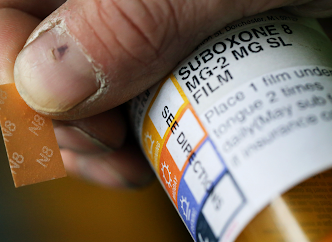 |
| A strip of Suboxone film, an opioid-addiction medication (Photo by Craig F. Walker, The Boston Globe, Getty Images via KFF Health News) |
 |
| Judge Duane Slone |
Eventually, Slone founded a drug-recovery court. "It allows defendants with nonviolent drug-related charges to avoid jail time by entering treatment and counseling," Sisk reports. But this type of court was so "resource-intensive, relatively few people can be enrolled. So in 2013, Slone introduced the Tennessee Recovery Oriented Compliance Strategy, an alternative to jail for those who aren't considered at high risk of recidivism but are deemed in urgent need of treatment. Many are pregnant women or mothers of young children. . . . Both the recovery court and TN-ROCS offer three medication options: buprenorphine, methadone, and naltrexone. . . . Since TN-ROCS' launch, Slone said, his community has seen a decrease in property crimes and its jail population."
Monica Christofferson, director of treatment-court programs at the Center for Justice Innovation, told Sisk she has seen a "huge shift" among judges, prosecutors, and law enforcement agencies away from the stigma associated with medication treatment, but rural areas still face unique challenges. "The relative unavailability in rural areas of medication treatment is certainly a problem. A shortage, Christofferson noted, is not only an issue in itself but also a barrier to overcoming stigma," Sisk reports. "More openings available [in treatment programs], more success stories. More success stories, less stigma. Fewer provider options also mean one bad actor — a provider who overprescribes or is otherwise negligent — perpetuates the stigma. Strict oversight is essential."
No comments:
Post a Comment